Post-Debate, Romney Is Clear GOP Frontrunner, Bachmann Surging
The race for the GOP nomination is taking shape.
In the wake of Monday’s Republican Presidential debate, three new polls are out which show Mitt Romney solidifying his frontrunner status, Tim Pawlenty still failing to break out of the lower tier of the field, and Michele Bachmann surging while everyone waits to see what Sarah Palin, Rick Perry, and Rudy Giuliani might do. All the usual caveats about early polling continue to apply, and its not easy to compare these polls because they aren’t polling the same group of candidates. However, as the campaign heads into the summer there are clear trends emerging and it’s unlikely that anything will change unless one of the holdouts enters the race and shakes up the field.
First, and perhaps most interesting, there’s a new Rasmussen poll that shows Romney in a lead, but also shows Michele Bachmann getting a huge boost from the debate:
Former Massachusetts Governor Mitt Romney continues to lead the race for the Republican nomination, but Michele Bachmann has surged into second place following her Monday night entry into the campaign.
A new Rasmussen Reports national telephone survey of Likely GOP Primary Voters, taken following the candidates’ Monday night debate, shows Romney earning 33% support, with Minnesota Congresswoman Michele Bachmann a surprise second at 19%. Georgia businessman Herman Cain is in third place with 10% of the vote.
Former House Speaker Newt Gingrich picks up nine percent (9%) support, followed by Texas Congressman Ron Paul with seven percent (7%), ex-Minnesota Governor Tim Pawlenty at six percent (6%) and former Pennsylvania Senator Rick Santorum also earning six percent (6%). Former Utah Governor Jon Huntsman, who did not participate in the debate but is expected to announce his candidacy on Tuesday, gets two percent (2%) of the vote. Eight percent (8%) prefer some other candidate.
Romney and Bachmann are tied among primary voters who say they are Tea Party members, with 26% support each. Romney holds a 36% to 16% lead over the congresswoman among non-members. Most primary voters regard all the candidates with the exception of Huntsman as conservative, but Bachmann is seen as the most conservative.
It’s not surprising that self-identified Tea Party members would be strongly behind Bachmann given the fact that she has closely identified with the movement virtually since it started and formed the Tea Party Caucus in Congress. What is slightly surprising, I suppose, is the fact that Romney is so strong among this group given their rather obvious ideological problems with him. This may be because at least some of these people are more concerned with beating President Obama in 2012 than being ideologically pure and Romney is the only candidate currently competitive with the President in head-to-head polls.
There’s even more surprising news in the cross-tabs, where, as Ed Morrissey notes, Bachmann actually leads among independents with 23% of the vote to 21% for Romney and 17% for Cain. Part of this may be a bump for Bachmann as a result of what most everyone agrees was a very good debate performance, but it may also be due to the fact that many voters are not entirely familiar with Bachmann at this point. That’s going to change and, once some of her more extreme views become more well-known, I doubt that independent voters will be quite so enthusiastic about her. Their natural candidates are people like Romney, Tim Pawlenty, and perhaps Jon Huntsman, not a hard right conservative like Michele Bachmann.
There’s also good news for Romney, though not so much for Bachmann, in the new MSNBC/Wall Street Journal Poll:
In a 10-candidate trial heat, Romney gets support from 30 percent of GOP primary voters. He’s followed by Palin at 14 percent, ex-pizza chain head Herman Cain at 12 percent, Perry at 8 percent, Paul at 7 percent and Gingrich at 6 percent. Next come Pawlenty and Santorum at 4 percent, Bachmann at 3 percent and Huntsman at 1 percent.
In a smaller trial heat consisting of just six Republican candidates, Romney’s lead jumps to 43 percent, with Paul and Bachmann at 11 percent, Santorum at 9 percent, Gingrich at 8 percent and Pawlenty at 7 percent.
The poll (PDF) also shows, though, that 45% of likely Republican primary voters remain dissatisfied with the field. While this number is lower than it has been in the past, most likely because the race is getting more coverage now so voters becoming more familiar with the candidates who are in thee race, it’s still fairly high and potentially good news for people like Rick Perry contemplating a late entry into the race.
However, Perry could face some problems of his own because of the possibility that the public will associate him with the guy whose job he took over in 2001, George W. Bush:
This graphic comes via Ed Morrissey, who notes that the reason that the Democrats continue to bring up the Bush Administration’s responsibility for the economic situation is because of polls like this that show it works. If that continues into 2012, then a GOP ticket with Perry at the top could face some problems. For voters who don’t really start paying attention to the race until Labor Day of election year, the superficial similarities between Bush and Perry could be a problem for the GOP. Additionally, Perry’s own comments in the past about issues like secession are likely to be fodder for much discussion on MSNBC and other cable networks, and I doubt that many independents are going to be too keen on a Presidential candidate who seems to want to re-fight an issue decided in 1865.
One caveat about this poll is worth noting, especially with respect to Michele Bachmann’s numbers. Most of the polling was done before Monday’s debate, so it doesn’t necessarily take the impact of Bachmann’s performance there into account. So, while 11% in the six candidate field is markedly below the Rasmussen number, at least part of that can be explained by the timing of the poll itself.
Finally, we have a new poll from Public Policy Polling (PDF) that suggests that GOP voters are starting to look at electability as being more important than ideological purity:
Last year Republicans scuttled their chances at taking back the US Senate by nominating far right unelectable candidates like Christine O’Donnell in Delaware, Sharron Angle in Nevada, and Ken Buck in Colorado. Now GOP voters seem to have learned their lesson: 56% say it’s most important to them to have a Presidential candidate who has the best chance of defeating Barack Obama, compared to only 31% who think it’s more important to have someone who’s conservative on every issue. That finding is an indication that the Tea Party’s influence within the Republican Party may be diminished. That’s bad news for Democrats…and good news for Mitt Romney.
Romney leads our newest poll with 22% to 17% for Herman Cain, 15% for Sarah Palin, 9% for Newt Gingrich and Tim Pawlenty, 8% for Michele Bachmann, 7% for Ron Paul, and 1% for Jon Huntsman.
Romney’s strength is with those voters for whom electability is the paramount concern. He gets 27% with them to 14% each for Cain and Palin and 12% for Pawlenty. With GOP partisans more concerned about ideology Romney is third at 16%, behind Cain’s 22% and Palin’s 18%.
(….)
If Palin doesn’t run Romney’s lead expands. He gets 27% to 20% for Cain, 13% for Bachmann, 12% for Gingrich, 10% for Pawlenty, 6% for Paul, and 3% for Huntsman. One piece of conventional wisdom that is true: the biggest beneficiary of Palin not running would be Bachmann. She gets 32% of the Palin supporters to 17% for Gingrich, 14% for Cain, and 13% for Romney.
As with the NBC poll, this poll was conducted before Monday’s debate, so it doesn’t reflect any changes to voter sentiment based up on that. If anything, then, I think it would be safe to assume that Bachmann’s numbers would be at least slightly higher and Cain’s a little lower.
A few thoughts based on these polls.
First, Mitt Romney is now the clear frontrunner in the race. This is likely in part a reflection of name recognition and the GOP’s traditional “next guy in line” history of picking nominees. The question, then, is inevitably going to turn to who the “anti-Romney” candidate is, and whether the conservative base will rally around one candidate or remain fractured among several candidates. The second possibility obviously helps Romney significantly, but he would also benefit if the anti-Romney candidate ends up being someone like Bachmann or Cain, who (notwithstanding the Rasmussen numbers) are unlikely to garner much committed support from independent voters in states with open primaries, or from the party Establishment. If it comes down to a Romney-Bachmann, Romney-Cain, or Romney-Palin race in the Spring of 2012, then I think Romney ends up winning the nomination.
Second, Tim Pawlenty is still not a top tier candidate regardless of what media pundits might say. The best he does in any of these polls is the 9% he gets in the PPP poll (he hits 4% in the NBC poll and 6% in the Rasmussen poll). His average in the RealClearPolitics “Poll of Polls” puts him below Ron Paul, Newt Gingrich, Michele Bachmann, Herman Cain and even Rick Perry (although Perry’s average is based on only three polls). Unless he finds a way to break through soon, he might find it hard to raise money and get press attention. More importantly, as I said Monday, if Rick Perry enters the race I think that’s basically the end for Tim Pawlenty.
Finally, it will be interesting to see if Bachmann’s surge is for real. I suspect that it is, for many reasons. Many people, myself included, have been underestimating her political potential for some time now, based mostly on her gaffes. She’s no Sarah Palin. For one thing, she is a much better public speaker, she’s able to speak off the cuff on the issues in a coherent manner, and she seems to have better public relations instincts than Palin does. Add to this the fact that she’s putting together a top-notch campaign staff, and one can clearly see a scenario develop when the top two candidates in the race heading into Super Tuesday are her and Mitt Romney. Whether she lasts beyond that is another question. Personally I don’t see her doing well in large states like California, New York, New Jersey, and Pennsylvania. Mark Halperin argues that Bachmann has a chance at the nomination, but it’s a slim one:
Not a great shot but a real one. If Tim Pawlenty fails to catch fire, Jon Huntsman flames out and Rick Perry and Palin take a pass, Bachmann can win the Iowa caucuses and head into a one-on-one matchup with front runner Mitt Romney. She may also benefit from being the only woman in a testosterone-fueled field. Unlike previous insurgents who fell short (Pat Buchanan, Mike Huckabee), Bachmann is a formidable fundraiser who should be able to buy plenty of TV airtime to go with an energized ground game.
The message is clear. Underestimate Michele Bachmann at your own risk.
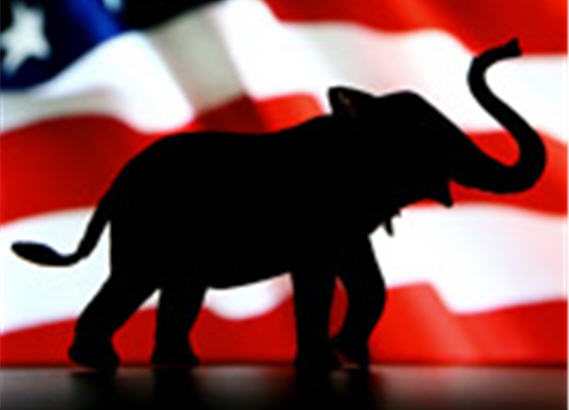


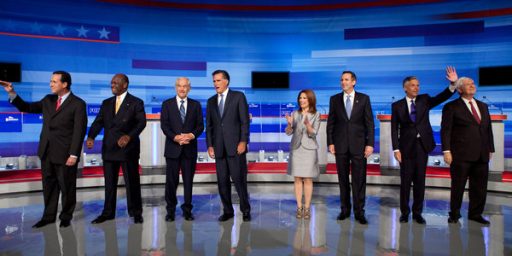
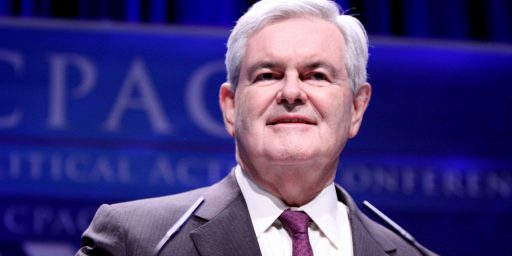
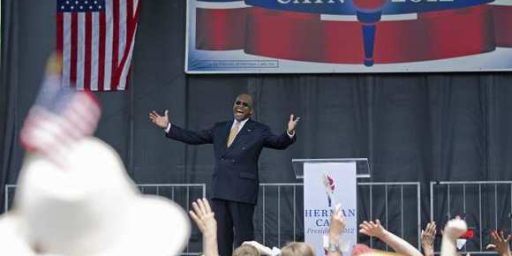
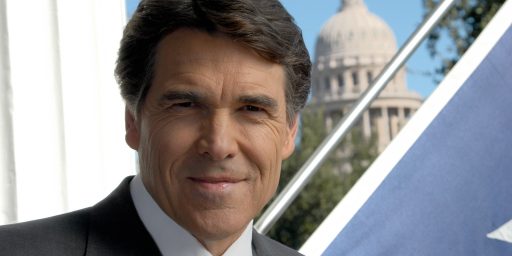
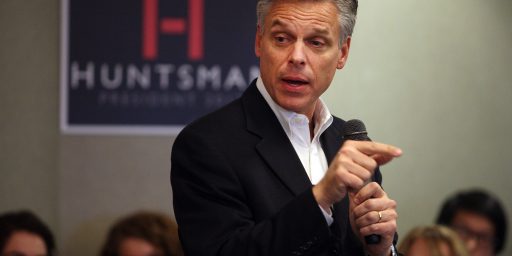
Rasmussen is such an outlier but it will be interesting to see if Bachmann gets a huge surge in the other polls. If so, it’ll be interesting.
On the economic responsibility question in the polls I notice they never ask how much the voters are to blame for buying into Republican voodoo economics and Democratic rosy scenarios that allowed the baby boomers to spend and spend and never pay up.
Voters to blame? That’s just crazy talk.
Why can’t all the generations be “The Greatest Generation?”
This makes me think of the fact that I was pretty satisfied with the choices on the Democratic side in 2008. 2004 not as much, but it still wasn’t so bad.
Who will be running in 2016? Biden and Clinton are probably too old. Gore and Edwards have too much baggage. I can’t see us going back to Kerry or Dean (plus they’re probably too old). Bill Richardson seems unlikely.
Looking through the list of Senators and Governors, the only names that really jump out are Andrew Cuomo and Mark Warner(*). Maybe Jim Webb if he goes back to politics. I’m wondering if Democrats might have a tough time of it in four years.
(*)Please let me know if I missed some. Oh, also of course Sheldon Whitehouse’s name jumped out. A name like that is always going to jump out for possible presidents.
@TG Chicago: I wouldn’t be surprised at all if Mark Warner made a bid. He’s a former Virginia governor and now a US Senator. He may be too moderate to survive the nominating process but he’d be a hell of a general election candidate. For that matter, his gubernatorial predecessor, Tim Kaine, might be interested. He’s currently the frontrunner for Webb’s seat, although it’s possible that George Allen gets it back.
Any positions in particular you’re thinking of?
And really, what’s your evidence that moderates can’t get through the Democratic nominating process? Clinton only lost by a hair. Kerry and Gore are surely moderates (well, Gore of 2000 — he may have immoderated a bit afterwards), and both won their nominations with little trouble.
Also, unrelated, is it okay to call gay men “faggots” on this site? If the answer is yes, just let me know and I’ll leave. If it’s no, then please let others know.
Romney = Kerry
Somewhat socially awkward and easily labelled as elitist flip-floppers.